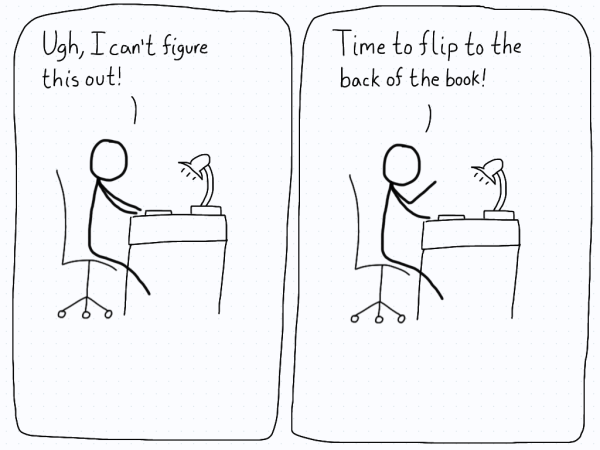EDUCATION, MATHEMATICS, SCIENCE
Attempting Problems

One of the most important things you can do when learning a new subject is attempting it with your best effort. While this sounds simple, so many people think they are too good for this step and skip it.
I was reminded of this at the beginning of last semester. One of my professors said, “When you read the chapters in the book, do the examples that are there. It’s extremely important that you do. It might be tempting to go through and read the solution of a problem and then say, ‘Oh yes, that makes sense.’ However, doing this won’t help you out in the long run.”
I couldn’t have put it better myself. This is exactly the kind of issue I run into all the time, and I know that it can affect others just as much. We have this idea that reading implies learning, but there are many ways to read a textbook and learn next to nothing about solving problems. This includes skipping through the exercises and examples, preferring to just read the solutions. This is good up until the point that you are faced with a question on your own, such as on a test. At that point, you may find that the problems are not so easy.
It’s simple to say, “Oh yes, this solution makes sense. I get it.” It’s much more difficult to think of what that solution is on your own. But this is what doing the examples in a textbook is for! They are there to allow you to think of the solution without a helping hand. The solutions are for after you’ve done this step.
This is so important, because I see people all the time take ten seconds to read a problem before saying, “I don’t know what to do.” Well, of course you don’t know what to do! You’ve barely had time to think about it at all.
The purpose of doing all these exercises is to give you a sense of what works and what doesn’t. As a consequence, you start to gain an eye for what a solution might look like. When I tell the students I tutor how I solved the problem they are struggling with, they look up at me in disbelief, as if they would never be able to do what I did. But they’re wrong. I didn’t do anything special. In fact, I did something I’ve done a bunch of times. That doesn’t mean I was as good when I was in the same year as them. It just means I’ve been at it longer and have put the work in to make those problems trivial.
It seems like a waste of time, but the real key to learning and succeeding in your studies is to attempt to do problems on your own, without referring to your text. I’m not suggesting you memorize every single formula in physics. Rather, I’m talking about learning to come up with your own strategies to solve problems. From there, it’s just a lot of practice and refinement. If you prefer to skip the work and read the solutions, this skill won’t be developed. You’ll always be looking for the “trick” to solve problems, instead of applying techniques. Therefore, it’s in your best interest to work through as many problems as you can. It will pay off in your future.